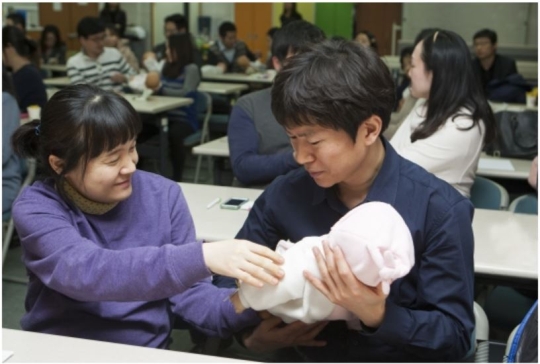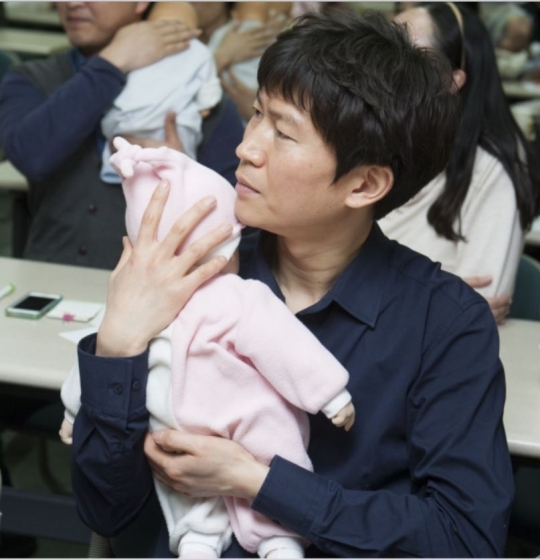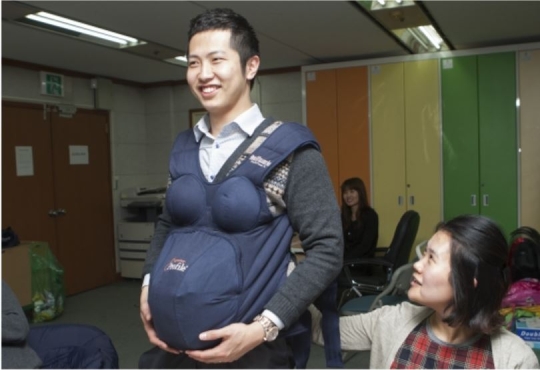Fathers prefer not to take child-care leave
Due to concerns over promotion, a lack of contingent workforce, and low pay
There is a growing number of fathers who are willing to provide care for their children. However, statistics show that only a small number of fathers actually uses child-care leave. According to last year’s data released by the Ministry of Employment and Labor, the number of fathers who took child-care leave recorded 2,293 which is a ten-fold increase from 208 in 2005. However, they only represented 3.3% of the total number of people on parental leave.
Under such circumstances, the government unveiled strategies to encourage more fathers to take child-care leave so that they can spend more time with their children. The government’s plans are expected to boost female employment rate as well.
Despite such efforts, fathers did not welcome the move with open arms. They spoke with one voice that a slight increase in allowance for the period of child-care leave is insufficient to motivate male employees to utilize child-care leave scheme.

Uneasy to take even monthly and yearly holidays
At 7 p.m. on every fourth Thursday, soon-to-be parents attend a parenting class at the Jungnang District Office. On February 27, Choi Youngmi, a Lamaze International certified childbirth educator, delivered a roughly two-hour lecture. 15 couples learned about the entire process of labor, breathing techniques for labor, postnatal care for mothers and babies, breast-feeding, and baby bath basics.
Immediately after work, Mr. Kim (31, Jungnang District) rushed to the Jungnang District Office with his wife and brother-in-law. This was his first time to attend the lecture. With his baby due in April, Mr. Kim said “My wife strongly recommended the class. That is why I came. To be honest, the lecture was very interesting and useful. I want to help her and provide more care for the baby.”
However, he noted that taking child-care leave is unthinkable. Mr. Kim is employed by a mid-size pharmaceutical company where no one has used the parental leave so far. He added “Personal connections are a prerequisite to promotion. I might lose favor in my boss’ eyes if I stop working temporarily. At a time when it is tough to take even monthly or annual leave, using a year-long child-care leave is unimaginable. My boss will not give permission. I am jut going to take a three-day leave and go back, while my wife will quit work to care for the baby.”

A lack of contingent workforce
Situations are worse for small businesses which are seriously affected by the shortage of workers. Seo Donghoon (34, Jungnang District) who works at a small company with 10 employees in the fire fighting business said “I am expecting a baby in July. I do want to spend much time for the baby, but the reality is that I can’t use child-care leave because it is difficult to find someone to replace me. Since there are only 10 employees, our operations will be hugely affected in the absence of one person. As for the measures that the government recently announced, he commented ”Such plans are unlikely to succeed. I am only going to take a short leave and go back to work.“
Mr. Kim (35, Bucheon, Gyeonggi Province) who works for a small architecture company is in a similar situation. He said “The government’s measures are unlikely to motivate fathers to take child-care leave.”
In his neighborhood, Mr. Kim is well known for his love and strong attachments toward his 13-month-old daughter. He would love to take advantage of parental leave and look after his daughter. However, Mr. Kim can’t do that because it is demanding to fill up a vacancy, though the government gives incentives for employers who hire contingent workers. He added “Parental leave is a luxury for a private sector employee like myself. I think only public servants who enjoy job security can afford it.”

Performance is a priority
Things are no better in major businesses because corporate culture and practice come first. Mr. You (33, Dongjak District) who works at a financial company pointed out “It is irrational to use child-care leave because it might have a negative impact on work performance.”
He added “People say that my company’s welfare programs are relatively better than those of competitors. However, in a conservative corporate culture like ours, no one out of 1800 male employees has actually used parental leave.”
Small child-care leave benefits may be another reason that fathers choose not to take the leave. Mr. You mentioned “The government said a father who takes the second parental leave will be given 100% of his regular wage for the first month. In reality, however, I heard that KRW 1.5 million is the maximum. In my case, wife used the leave because she earns less than I do. After all, financially supporting the family is critical.”
Mr. You went on to say that “Although it is important to change corporate culture itself, it may be more efficient to provide incentives so that employers will provide a better environment for fathers to take the leave. For instance, the government should consider granting subsidies to companies with a certain portion of fathers on parental leave, just as tax incentives are provided to businesses which hire people with disabilities.”

